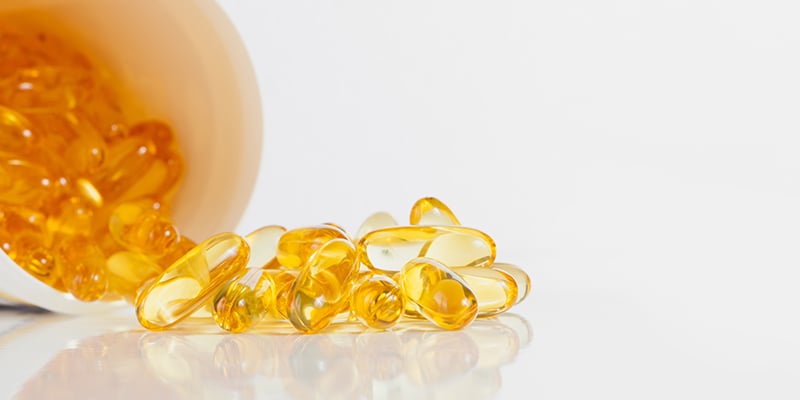
Neuroimaging shows increased blood flow in regions of the brain associated with memory and learning for people with higher omega-3 levels, according to a new report in the Journal of Alzheimer’s Disease.
Amsterdam, NL, May 19, 2017 – The incidence of Alzheimer’s disease (AD) is expected to triple in the coming decades and no cure has been found. Recently, interest in dietary approaches for prevention of cognitive decline has increased. In particular, the omega-3 fatty acids have shown anti-amyloid, anti-tau and anti-inflammatory actions in the brains of animals. In a new article published in the Journal of Alzheimer’s Disease, researchers have found that for patients with high omega-3 levels, blood flow in specific areas of the brain is increased.
“This study is a major advance in demonstrating the value of nutritional intervention for brain health by using the latest brain imaging,” commented George Perry, PhD, Dean and Professor of Biology, The University of Texas at San Antonio, and Editor-in-Chief of the Journal of Alzheimer’s Disease.
Single photon emission computed tomography, or SPECT, can measure blood perfusion in the brain. Images acquired from subjects performing various cognitive tasks will show higher blood flow in specific brain regions. When these images were compared to the Omega-3 Index, a measure of the blood concentration of two omega-3 fatty acids, eicosapentaenoic acid (EPA) and docosahexaenoic acid (DHA), investigators found a statistically significant correlation between higher blood flow and higher Omega-3 Index. In addition, they evaluated the neuropsychological functions of the subjects and found that omega-3 levels also correlated with various psychological feelings using a standardized test battery (WebNeuro).
This study drew from a random sample of 166 participants from a psychiatric referral clinic for which Omega-3 Index results were available. The participants were categorized into two groups of higher EPA+DHA concentrations (>50th percentile) and lower concentrations (<50th percentile). Quantitative brain SPECT was conducted on 128 regions of their brains and each participant completed computerized testing of their neurocognitive status.
Results indicated statistically significant relationships between the Omega-3 index, regional perfusion on brain SPECT in areas involved with memory, and neurocognitive testing.
Overall, the study showed positive relationships between omega-3 EPA+DHA status, brain perfusion, and cognition. Lead author Daniel G. Amen, MD, of Amen Clinics Inc., Costa Mesa, CA, adds, “This is very important research because it shows a correlation between lower omega-3 fatty acid levels and reduced brain blood flow to regions important for learning, memory, depression and dementia.”
Co-author William S. Harris, PhD, University of South Dakota School of Medicine. Vermillion, SD, lends this perspective, “Although we have considerable evidence that omega-3 levels are associated with better cardiovascular health, the role of the ‘fish oil’ fatty acids in mental health and brain physiology is just beginning to be explored. This study opens the door to the possibility that relatively simple dietary changes could favorably impact cognitive function.
If you suspect that you or a loved one is experiencing symptoms of Alzheimer’s disease, dementia, or other memory problems, Amen Clinics can help. Our experienced staff will help you learn more about your brain, support you in preventing Alzheimer’s and dementia and assist with early diagnosis and intervention.
If you’re ready to take control over your future, call us today at 888-288-9834 or visit our website to schedule an appointment.





This is interesting. Is the research published? What does statistically significant correlation mean? Was a control group used too?
Comment by Joel — December 8, 2017 @ 12:21 PM
Has your work with the brain given any more knowledge of migraine aura? The information available seems very very scarce.
Comment by Ruth — December 11, 2017 @ 9:00 AM
A statistical correlation indicates the the likeihood that one factor affects the other. A statistically significant correlation means that random chance could not cause the study results. The higher the correlation the stronger the relationship is between the factors.
A control group is only used when comparing a condition against the general population. It is looking for more general information like whether adding a supplement to your diet makes you healthier than the other people your age. This study was a comparison study between two conditions: high levels and low levels of Omega-3. It was looking for specific information about only those two conditions. Because they are more specific, comparison studies do not need a control group. However, that means you have to remember that the results do not tell you anything about how this relates to the average person. In this case, we have no way of knowing whether the average person has high or low levels of Omega-3. To find that out would require different type of study to look for that kind of information. So, while the results of this study are interesting, they cannot tell us whether we should consider taking a supplement or not.
The research was published in the “Journal of Alzheimer’s Disease”.
Comment by Sue — December 16, 2017 @ 9:06 AM
What strength of supplement do you recommend?
Comment by shirley — December 30, 2017 @ 1:04 PM
Fish oil (Omega-3 ) strength 1400 mg maximum available in stores .
Comment by venkat — May 3, 2018 @ 12:33 AM
What strength fish oil do you suggest. I’ve been trying to get 900 mg of DHA per day.
Comment by Marilee Hilgendorf — May 3, 2018 @ 12:55 AM
As per d endocrinologist that my mom is seeing for diabetes, she is given fish oil 2/day now for maintenance.,turning 90.
If cholesterol hi, 2 am 2 noon 3 pm.-must be below 150. Taking januvia at nite nd regulating her food drinks in take.
Comment by Gilda — July 9, 2018 @ 5:13 AM
Shirley, Marilee Hilgendorf – I inherited the propensity for Hypercholesterolemia, with a tendency for low HDL (high-density lipoproteins) and higher LDL–the reverse of what’s optimal for healthy heart and vascular. Luckily I was aware of this in the 70’s and began to tailor my diet and health habits accordingly. My sticking point was to keep the numbers in the correct ratio’s it required excessive amounts of multiple
physical exercise–eventually it harmed my deteriorating LS spine and contributed to ME/FM. So, in addition to a healthy diet, I added healthy oils to raise my HDL levels to oppose the LDL since eating fish is not a choice for me due to Mercury toxicity due to numerous amalgams needing safe removal, and fish are irritating to my kidneys and change the chemical make up of urine aggravating stones. Once I added additional oils to everyday (EVOO, Cold-pressed SunFlower Seed Oil, Avacado Oil,etc) the HDL increased, LDL decreased but not enough. My husbands cardiac doctor taught us when taking Fish Oil supp’s to use the following ratio: 3 parts EPA : 1 part DHA, using small fish, clean sourced, hexane free extraction methods, 3rd party tested and by doing that my HDL:LDL ratio has been excellent. Currently I take “Ultra Strength Omeaga-3 Fish Oil by VIVA Naturals , 2200 mg overall, 1400 mg EPA & 480mg DHA per two gel-cap serving with a desirable low “other Omega’s (6 & 9’s) of 120 mg (from AMZ). These are very concentrated caps therefore are narrower than most and easier to swallow. I don’t believe in statins after observing what they did to others in my family despite 2 docs trying to force me via scare tactics to take them. Since the brain uses healthy cholesterol to maintain and function optimally, I’m accepting my somewhat elevated (by “todays somewhat skewed standards”) cholesterol since the body responds according to what it needs.
Comment by J-Lynn — July 14, 2018 @ 5:31 AM
I live in U.K. .i want more information plz.i thought my son have this he is 30 year old I am worried all the time.how you can help me plz
Comment by Fatima — August 4, 2018 @ 11:58 AM